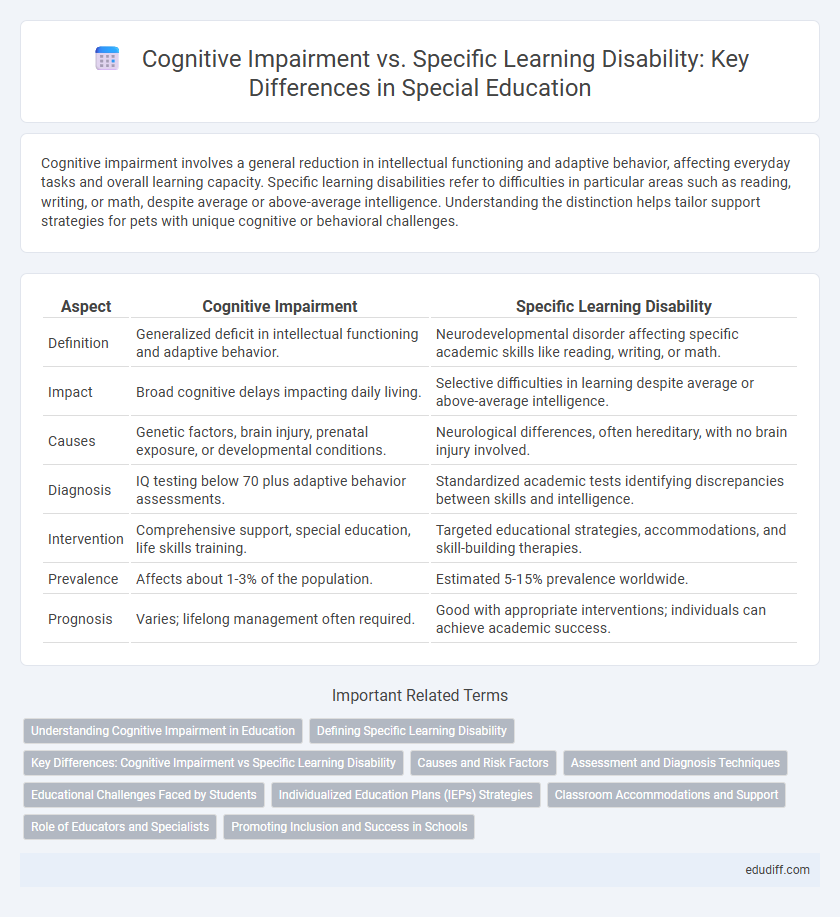Cognitive impairment involves a general reduction in intellectual functioning and adaptive behavior, affecting everyday tasks and overall learning capacity. Specific learning disabilities refer to difficulties in particular areas such as reading, writing, or math, despite average or above-average intelligence. Understanding the distinction helps tailor support strategies for pets with unique cognitive or behavioral challenges.
Table of Comparison
| Aspect | Cognitive Impairment | Specific Learning Disability |
|---|---|---|
| Definition | Generalized deficit in intellectual functioning and adaptive behavior. | Neurodevelopmental disorder affecting specific academic skills like reading, writing, or math. |
| Impact | Broad cognitive delays impacting daily living. | Selective difficulties in learning despite average or above-average intelligence. |
| Causes | Genetic factors, brain injury, prenatal exposure, or developmental conditions. | Neurological differences, often hereditary, with no brain injury involved. |
| Diagnosis | IQ testing below 70 plus adaptive behavior assessments. | Standardized academic tests identifying discrepancies between skills and intelligence. |
| Intervention | Comprehensive support, special education, life skills training. | Targeted educational strategies, accommodations, and skill-building therapies. |
| Prevalence | Affects about 1-3% of the population. | Estimated 5-15% prevalence worldwide. |
| Prognosis | Varies; lifelong management often required. | Good with appropriate interventions; individuals can achieve academic success. |
Understanding Cognitive Impairment in Education
Cognitive impairment in education refers to significant limitations in intellectual functioning and adaptive behavior, impacting memory, problem-solving, and attention skills necessary for learning. Unlike specific learning disabilities, which involve difficulties in particular academic areas such as reading or math despite average intelligence, cognitive impairment affects overall cognitive processes and learning capacity. Understanding these distinctions allows educators to tailor interventions and support plans that address broad intellectual challenges rather than isolated skill deficits.
Defining Specific Learning Disability
Specific Learning Disability (SLD) refers to a neurologically-based condition that impairs an individual's ability to process and acquire academic skills such as reading, writing, or mathematics. Unlike cognitive impairment, which involves broader intellectual deficits, SLD affects specific areas of learning despite average or above-average intelligence. Identification of SLD typically involves standardized testing and educational assessments that highlight discrepancies between ability and achievement in targeted academic domains.
Key Differences: Cognitive Impairment vs Specific Learning Disability
Cognitive impairment involves broadly reduced intellectual functioning and adaptive behavior affecting daily life skills, while specific learning disability (SLD) refers to difficulties in specific academic areas such as reading, writing, or math despite average intelligence. Cognitive impairment typically manifests with lower IQ scores below 70, whereas SLD is characterized by discrepancies between intellectual ability and academic achievement. Diagnostic criteria for cognitive impairment emphasize global developmental delays, whereas SLD diagnosis relies on specialized assessments identifying domain-specific deficits without generalized intellectual delays.
Causes and Risk Factors
Cognitive impairment often results from genetic conditions, brain injuries, prenatal exposure to toxins, and neurodevelopmental disorders, which interfere with overall intellectual functioning and adaptive behaviors. In contrast, specific learning disabilities are primarily linked to neurological differences affecting information processing, with risk factors including family history, premature birth, and low birth weight. Environmental factors like poor nutrition and limited early stimulation can exacerbate both cognitive impairment and specific learning disabilities, highlighting the complex interaction of biological and environmental influences.
Assessment and Diagnosis Techniques
Assessment of cognitive impairment typically involves standardized IQ tests and neuropsychological evaluations to measure intellectual functioning and adaptive behavior, while specific learning disability diagnosis relies on achievement tests alongside response to intervention (RTI) data to identify discrepancies between potential and performance. Neuroimaging and genetic testing may complement cognitive impairment diagnosis by revealing structural or functional brain abnormalities, whereas specific learning disability assessments emphasize cognitive processing skills such as phonological processing and working memory. Multidisciplinary teams integrate clinical interviews, educational history, and behavioral observations to ensure accurate differential diagnosis and tailored intervention planning.
Educational Challenges Faced by Students
Students with cognitive impairment often experience broad intellectual difficulties that affect memory, attention, and problem-solving skills, making it challenging to follow multi-step instructions and comprehend complex concepts. In contrast, those with specific learning disabilities encounter difficulties in particular areas such as reading, writing, or math, despite having average or above-average intelligence, which requires targeted interventions like individualized education plans (IEPs). Both groups face educational challenges that demand specialized teaching strategies, adaptive learning materials, and continuous support to foster academic progress and self-confidence.
Individualized Education Plans (IEPs) Strategies
Individualized Education Plans (IEPs) for cognitive impairment emphasize tailored support that enhances memory, reasoning, and attention skills through repetitive, structured activities and assistive technologies. In contrast, IEPs for specific learning disabilities focus on targeted interventions in reading, writing, or math, using multisensory instruction and task analysis to address processing difficulties. Both strategies require ongoing progress monitoring and collaboration among educators, therapists, and families to ensure personalized goals meet each student's unique needs.
Classroom Accommodations and Support
Classroom accommodations for cognitive impairment include extended time on tests, simplified instructions, and the use of assistive technology to support memory and processing challenges. For specific learning disabilities, interventions such as multisensory instruction, individualized education plans (IEPs), and targeted skill-building strategies enhance reading, writing, or math proficiency. Both conditions benefit from personalized support, but cognitive impairment necessitates broader adaptive measures, while specific learning disabilities require focused academic skill remediation.
Role of Educators and Specialists
Educators and specialists play a crucial role in identifying and differentiating cognitive impairment from specific learning disabilities through targeted assessments and continuous observation. Customized intervention strategies are designed to address unique learning needs, enhancing educational outcomes for affected students. Collaboration among teachers, psychologists, and speech therapists ensures comprehensive support and effective skill development.
Promoting Inclusion and Success in Schools
Cognitive impairment and specific learning disabilities require tailored educational strategies to promote inclusion and academic success in schools. Implementing individualized education programs (IEPs) and utilizing assistive technology help address diverse learning needs effectively. Collaborative efforts among educators, specialists, and families foster supportive environments that empower students to achieve their full potential.
Cognitive Impairment vs Specific Learning Disability Infographic

 edudiff.com
edudiff.com